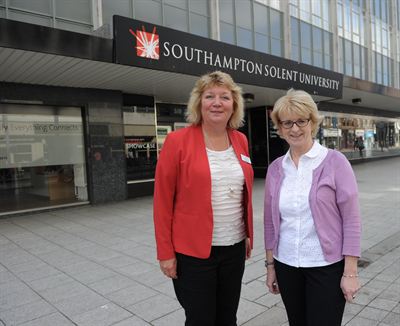HR professionals debate wellbeing in the workplace

Wellbeing: nice to do or is it now a business imperative? That was the debate among Southampton Solent University’s Human Resource Management (HRM) Network at an event last month.
Providing an insight into the latest evidence on the return on investment for health and wellbeing in the workplace, the event also supported individuals to develop a business case for implementation in their own organisations and looked at why taking a strategic approach to wellbeing at work will achieve the best results.
Guest speaker Jane Abraham introduced the Workplace Wellbeing Charter and its benefits and says: “It was really encouraging to see so many organisations interested in workplace wellbeing.
“The evidence that connects wellbeing with engagement, productivity and growth is now indisputable; putting in place good practice early on will help local businesses attract and retain the best talent and also help the local economy to grow” she continued.
The Workplace Wellbeing Charter is a voluntary, self-assessment scheme open to public, private and voluntary sector organisations in Southampton.
Part of a wider national initiative, the charter helps organisations to make their workplace a supportive and productive environment and demonstrates a commitment to the health and wellbeing of employees.
It focuses on eight key areas; leadership; attendance management; health and safety requirements; mental health and wellbeing; smoking; physical health, healthy eating and alcohol and substance misuse, against which organisations must achieve particular standards. The charter reflects best practice and is endorsed by Public Health England.
An assessor for the Charter, Jane is Director and owner of Flourish Workplace Ltd, an Honorary Research Fellow of the University of Exeter Medical School and Vice President of International Stress Management Association UK. She has won multiple awards for her health and wellbeing programmes.
Solent’s HRM Network, established in 2011, helps managers keep up-to-date on current areas of interest. Open to HR professionals and business leaders with a passion for people management and people development issues, it provides opportunities for learning and development and networking. Events are held throughout the year to explore and debate topical issues, with presentations from respected HR professionals. Join the Network on LinkedIn: https://www.linkedin.com/grp/home?gid=4010352&trk=my_groups-tile-flipgrp.
More information about the Health and Wellbeing Charter is available from the Public Health team at Southampton City Council, or email wellandworking@southampton.gov.uk.
Southampton Solent’s own commitment to supporting the health and wellbeing of its employees was recently recognised at the 2015 Responsible Business Awards. A commendation was received in the Bupa Employee Wellbeing category for Solent Health Spark, a programme created in 2009 in response to the government developing a wellbeing at work agenda and industry-specific initiatives within the higher education sector.
Originally aimed at staff, the programme has evolved to include the student population, taking a whole university community approach to health improvement. It has created a wide range of opportunities for staff to improve their health within the working day with 92% of staff agreeing that Solent provides good levels of support for wellbeing.
FOR FURTHER INFORMATION CONTACT THE MEDIA OFFICE ON 023 8201 3642 or press.office@solent.ac.uk
About Southampton Solent University
Southampton Solent University offers more than 19,000 students over 200 qualifications ranging from HND to PhD, in subjects such as maritime education and training, fashion and design, media and television, music, health, sport and leisure, business, IT and technology. The University was awarded the 2013 Quality Assurance kitemark for quality and standards of teaching and learning. Solent was voted one of the most creative universities in the UK in a Which? University 2014 poll of students. Solent Business School has been awarded the Small Business Charter Award, which is supported by the Association of Business Schools and the Department for Business, Innovation and Skills and ‘gold approval’ by the Association of Chartered Certified Accountants (ACCA).
Tags:


